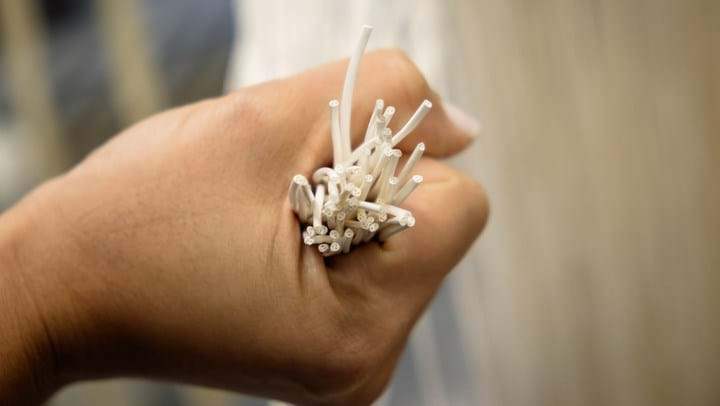Novel water treatment pilot plant

RESEARCHERS in Singapore are to build a pilot membrane filtration plant to treat industrial wastewater. The new plant will allow a semiconductor company to reduce liquid waste by more than 90% and allow it to recover precious metals from treated water which could then be sold and reused.
The pilot plant will use a novel water treatment system that employs a novel type of hollow-fibre membrane (HFM) invented by Neal Chung, Professor at the National University of Singapore (NUS), Singapore. HFMs are a class of artificial membranes, common in water treatment, that contain a semi-permeable barrier in the form of hollow fibre. Conventional HFMs have a single hollow core, but Chung’s tri-bore HFMs contain three hollow cores, increasing water flowrate by about 30%.
The plant will be located at an undisclosed semiconductor factory in Singapore, which currently transports toxic wastewater produced during manufacturing to a wastewater disposal facility for incineration. This process uses five times the energy cost expected for the pilot plant.
The semiconductor company is expected to save 1.6m L/y of water, allowing it to save S$250,000 (US$187,277) in disposal costs.
At the semiconductor factory the plant could treat up 5,000 L/d of water. It is expected to filter more than 90% of the wastewater into clean water and concentrate the metal waste into liquid, which can then be sold to other companies.
Commissioning of the plant is expected in the second quarter of 2019. It will be built jointly by the Separation Technologies Applied Research and Translation (START) Centre and Memsift Innovations, under a new research partnership. The START Centre is a national level facility which aims to develop and commercialise innovative separation and filtration technologies. Memsift Innovations is a local water technology firm that specialises in zero-liquid discharge water treatment systems.
The companies will use the piloting results to commercialise the technology, which will be a step towards a circular economy, ie one in which waste is minimised and resource use is maximised. In this case, waste will be turned into resources, and water will be recycled for industrial purposes, helping Singapore to conserve its clean water supply.
If the pilot is successful, Memsift will obtain a full licence from NTUitive, the innovation and enterprise company of Nanyang Technological University (NTU) Singapore, and commercialise it together with its proprietary technologies. The novel technology would also be made available to the members of Singapore’s National Membrane Consortium, SG-MEM. The START Centre is the leading body of SG-MEM, and Memsift is an industry member.
Adil Dhalla, Managing Director of the START Centre, said: “This pilot plant marks the first of many local water innovations which START is translating for commercialisation. Using our cutting-edge membrane fabrication, module design and testing facilities, we are able to scale up novel technologies from Singapore’s institutes of higher learning rapidly and to test them in real-life environments to validate their commercial value.”
According to Dhalla this is the START Centre’s first successful agreement since it started in 2016. The Centre seeks to turn cutting-edge membrane research from Singapore’s universities into real products that can be used by multinational and local companies.
J Antony Prince, Founder of Memsift Innovations, said: “Our filtration process operates at relatively low pressures and temperatures as compared to the conventional thermal-based separation processes. It saves energy, reduces operational cost, recovers precious metal and resources, while helping to save the environment,”
Prince believes that the novel tri-bore HFM will help improve the efficiency of Memsift’s patent-pending thermal separation process, which it claims provides unique benefits over traditional brine treatment and zero-liquid discharge solutions.
The START Centre is supported by Singapore’s Economic Development Board (EDB) and NTU Singapore.
Recent Editions
Catch up on the latest news, views and jobs from The Chemical Engineer. Below are the four latest issues. View a wider selection of the archive from within the Magazine section of this site.




